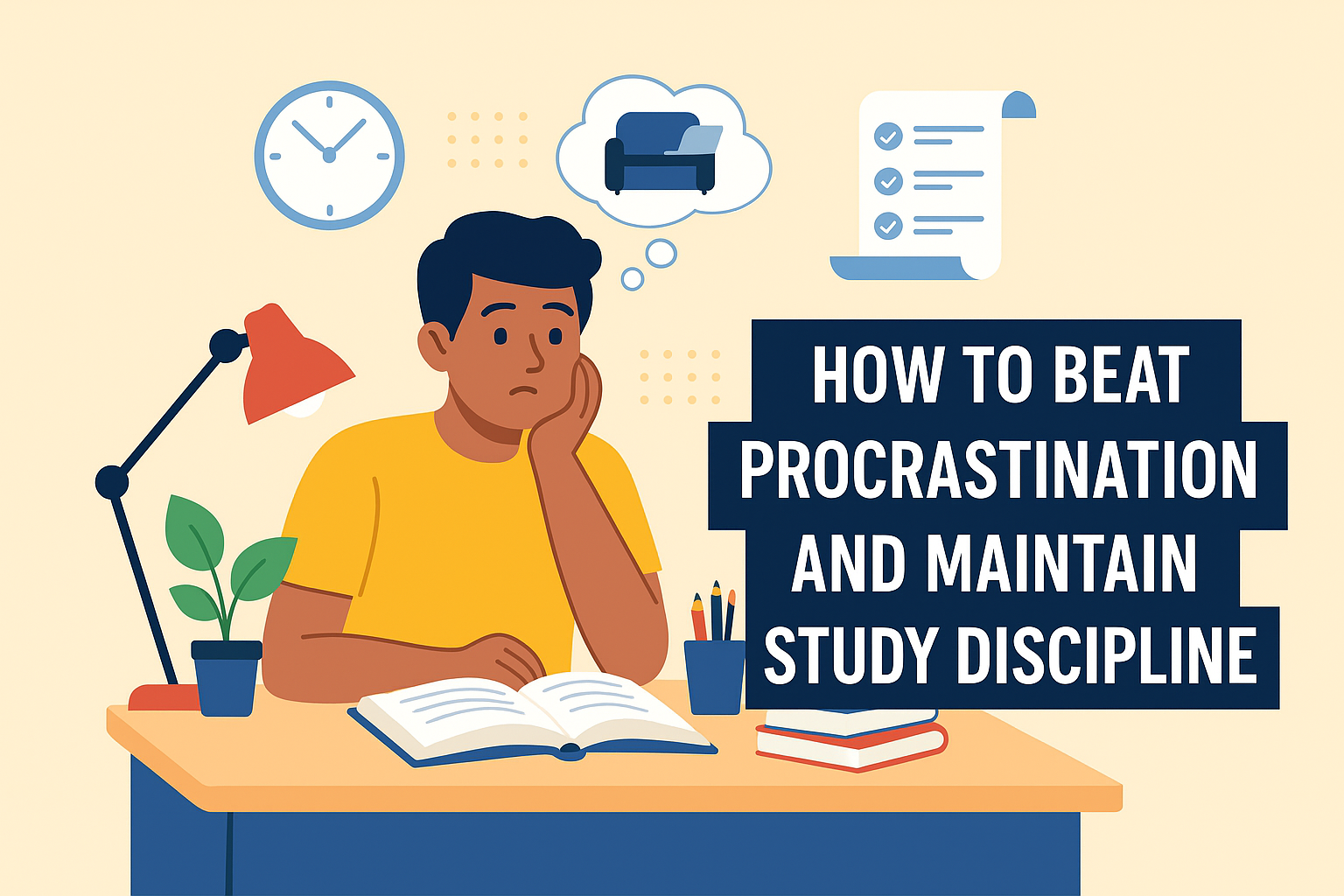Procrastination is something almost every student struggles with. You sit down with the intention to study, but suddenly scrolling social media, watching “just one” video, or reorganising your desk feels more urgent. Hours pass, and guilt sets in. The real challenge is not lack of intelligence or resources, but lack of study discipline.
Developing discipline is the key to consistent academic success. Let us explore how you can beat procrastination, build habits that stick, and maintain focus throughout your preparation journey.
Understanding Why We Procrastinate
Before solving the problem, it is important to understand why procrastination happens. Common reasons include:
- Fear of failure – avoiding study because you’re scared of not performing well.
- Perfectionism – waiting for the “perfect time” to start.
- Lack of interest – subjects feel boring or overwhelming.
- Poor time management – no structured routine.
- Distractions – phones, television, or friends breaking concentration.
Once you know the reason behind your procrastination, you can choose the right strategy to overcome it.
The Importance of Study Discipline
Discipline is not about forcing yourself into long hours of dull studying. It is about creating a structure where studying becomes a habit, not a burden. With discipline:
- You achieve more in less time.
- Stress reduces because work is not piled up till the last moment.
- You build confidence before exams.
- Consistency ensures long-term retention of concepts.
Practical Strategies to Beat Procrastination
1. Break Tasks into Smaller Chunks
Large chapters or lengthy assignments often feel overwhelming. Instead of thinking “I need to finish the entire book,” break it down into manageable parts. For example:
- Read 5 pages at a time.
- Solve 10 maths problems at once.
- Write 200 words of an essay, not the entire essay in one go.
Completing small chunks gives a sense of progress and reduces resistance.
2. Use the Pomodoro Technique
The Pomodoro method is a powerful tool against procrastination. It works like this:
- Study for 25 minutes with full concentration.
- Take a 5-minute break.
- After four such sessions, take a longer break of 15–20 minutes.
This technique trains your brain to focus and prevents burnout.
3. Remove Distractions
Phones and notifications are the biggest enemies of discipline. Some simple measures include:
- Keep your phone in another room while studying.
- Use apps that block social media during study hours.
- Inform family or friends about your study schedule to avoid interruptions.
Creating a distraction-free environment boosts productivity immediately.
4. Follow a Fixed Routine
Consistency comes from routine. Fix:
- A regular study time (for example, 7 am to 10 am).
- A dedicated study place.
- A fixed sleep cycle.
When your brain knows it is “study time”, it automatically shifts into focus mode.
5. Start With Easy Tasks
When you feel lazy, begin with something small and easy. Once you start, momentum builds and tackling difficult tasks becomes easier.
Example: Revise class notes first before attempting mock tests.
6. Use Rewards and Accountability
Motivation improves when you reward yourself after completing a task. For example:
- After finishing a chapter, allow yourself 15 minutes of music.
- After solving a practice test, enjoy your favourite snack.
You can also create accountability by studying with a partner or joining a group where you report daily progress.
7. Keep a To-Do List
A written to-do list helps you stay organised. Make it realistic – don’t load too much in one day. Crossing tasks off gives a sense of achievement and encourages you to continue.
8. Cultivate Self-Discipline Gradually
Discipline is like a muscle – it grows stronger with practice. Don’t expect overnight change. Start small:
- Commit to 1 hour daily without distraction.
- Slowly extend to 2–3 hours.
With time, your ability to sit and study will improve naturally.
Building a Disciplined Study Lifestyle
Procrastination is not just about study habits but also lifestyle choices. Here are ways to build discipline into your daily life.
Healthy Sleep
Late-night study with poor sleep makes you tired and unmotivated. Ensure 7–8 hours of quality sleep for sharp focus.
Proper Diet
Heavy junk food makes you sluggish. Eat balanced meals with fruits, vegetables, nuts, and water to stay energetic.
Physical Exercise
Even a 20-minute walk or yoga session helps reduce stress and improves concentration.
Mindset Training
Practice affirmations like “I am consistent in my studies”. A positive mindset strengthens discipline.
Long-Term Methods to Maintain Discipline
1. Set Clear Goals
Vague goals like “I will study today” do not work. Instead, set measurable goals:
- “I will complete 20 questions in physics.”
- “I will revise two case laws.”
Clear goals keep you focused and reduce procrastination.
2. Track Your Progress
Maintain a study journal or use apps to track your daily performance. Seeing progress over weeks motivates you to stay disciplined.
3. Visualise the Outcome
Imagine the happiness of clearing exams or securing admission into your dream college. Visualisation creates emotional motivation, pushing you to act.
4. Balance Study and Leisure
Discipline does not mean cutting out enjoyment. Plan leisure time wisely – meet friends, watch movies, or pursue hobbies. Balanced life prevents burnout.
5. Learn to Say “No”
You will often face invitations, distractions, or temptations. Learn to politely say no when they interfere with your study schedule. Protecting your time is key to discipline.
Common Mistakes Students Make
- Waiting for “perfect motivation” instead of starting now.
- Multitasking – it reduces efficiency.
- Setting unrealistic timetables that lead to disappointment.
- Ignoring rest and pushing beyond limits.
Avoiding these mistakes will save time and energy.
Beating Exam-Time Procrastination
During exams, procrastination peaks due to pressure. Some extra tips:
- Make a revision timetable with deadlines.
- Prioritise important topics instead of chasing perfection.
- Revise actively – use flashcards, self-quizzing, and previous year papers.
- Stay away from last-minute distractions like endless discussion groups.
Motivational Techniques to Stay on Track
- Daily Affirmations – start your day with positive statements.
- Study Motivation Videos – sometimes an inspiring story helps you begin.
- Role Models – read about toppers or professionals who worked hard.
- Peer Influence – study with serious students, not procrastinators.
Final Thoughts
Procrastination may feel unbeatable, but small consistent steps can bring transformation. Discipline is not about being perfect every single day – it is about showing up again even if you slip.
Remember:
- Start small, stay consistent.
- Create an environment free from distractions.
- Reward progress, not just results.
- Maintain a balanced routine with sleep, food, and exercise.
With these strategies, beating procrastination and building strong study discipline is absolutely possible. Once you develop this habit, success in exams and beyond will naturally follow.
Calling all CA dreamers!
🔴 Are you tired of searching for the perfect articelship or job?
Well, fear no more! With 10K+ students and professionals already on board, you don't want to be left behind. Be a part of the biggest community around! Join the most reliable and fastest-growing community out there! ❤️
And guess what? It’s FREE 🤑
✅ Join our WhatsApp Group (Click Here) and Telegram Channel (Click Here) today for instant updates.




